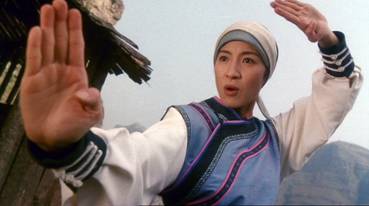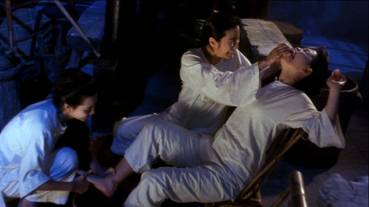|
For
any long term fan of martial arts cinema, the opening minutes of Wing Chun should stir some memories, with its garish yellow titles,
cheesy music and unlit exteriors, suggesting a work from
the first-wave heyday of the mid-1970s. But not only was Wing
Chun released in 1994, a year after
the same director's stylistically acclaimed Iron
Monkey, but it's also regarded as one of the last
works of what was essentially the genre's second wave, six
years before Crouching Tiger, Hidden Dragon
was to kick off the third wave revival that is still going strong.
Wing Chun is less a transitional work than a barometer of genre's early 90s
fragmentation, with traditional martial arts fighting, flying
wire work, swordplay, broad character comedy and even sex
farce all stirred into the pot. What makes it worthy of any genre fan's attention – well
one of the things – is that it blends these sometimes diverse
elements so enjoyably, hopping deftly from comedy to action
and back again, and even effectively blending the two, an
approach demonstrated just five minutes in when the title
character battles bandits using fellow villager Wong as
a weapon, manipulating him with a series of rapid prods
and shoves.

Set
in remote rural China in days of old, the comedy-of-errors
plot centres around Yim Wing Chun, female co-owner of the local
tofu shop and the finest fighter in town, a cause of considerable
embarrassment for the local men folk. One of them, Scholar
Wong, has eyes for Wing, that is until the beautiful Yim
Neung arrives in town and is adopted by Wing and her acid-tongued and
bad-breathed sister, 'Auntie' Fong. With Wing now dressing
in more masculine fashion, Yim is employed as the shop's
'tofu beauty', attracting record sales as men fall over
themselves to be served by her, Wong included. Enter Leung
Pok To, returning after a ten year absence with the intention
of marrying childhood sweetheart Wing, but on mistaking
her for a man, he chases instead after Yim under the mistaken
impression that she is the adult Wing. As you might have gathered, this is not your typical
martial arts movie plot. It doesn't end there.
With his gender misapprehension in place, Leung believes
that Wing is Yim's boyfriend, and thus believes that the woman who is Wing Chun is
dating the woman he thinks is Wing Chun. And while Wong
dreams of romance with Yim, Auntie Fong becomes fixated
on reeling him in for herself. Oh, and the brother of Flying
Monkey, the head of the local band of bandits, also fancies
Yim and arranges to have her kidnapped, providing us with
the expected genre bad guys for Wing to go one-to-one with.
Daffy
though all this is, especially given the absurdity of a
woman of Michelle Cheung's looks being mistaken for a man
just because of how she's dressed, it does move at a brisk pace and is performed with enough ludicrous gusto to prompt
genuine laughter. More surprising, perhaps, are the lesbian
overtones provided by this set-up (and a couple of lines
of dialogue), in particular a shot in which Wing and Yim
look almost lovingly into each others eyes, and a foot massage
delivered by Yim that drives Auntie Fong into an orgasmic
frenzy. Mind you, she does seem to be prone to them, engaging
in substitute sex with Scholar Wong at a grinding wheel,
and later emerging from her bedroom in a dishevelled daze
after tricking him into the real thing. Despite genre icon
Donnie Yen's co-starring role, the women repeatedly steal the show,
being smarter, sassier and in Wing's case the better fighter,
an element that foreshadows the strong female roles in Crouching
Tiger, which also featured Yeoh. It's an aspect that is starkly emphasised when Wing punishes the bandit who
attempts to kidnap Yim with a fiery emasculation.
But
essentially this is all the string that binds the pearls,
and in the action scenes the film really shines, with the fights
initially more earth-bound than the more recent Yuen Woo-ping
standard, though once Wing and Flying Monkey go head-to-head
things get pretty airborne. Both Yeoh and Yen really get
to show their stuff in fight sequences that were action-directed by Yen, the real show-stopper being a horseback
battle fought in the midst of flaming fences, though Wing's
challenge to a would-be tough guy to break a tray of tofu
is a delightful mix of lightning choreography and object
acrobatics.

Taking
its title from the kung fu style made famous by the late
Bruce Lee, which is only featured in part in the film, Wing
Chun may lack the visual polish of the likes of Iron
Monkey and generally be regarded as a slightly
lesser work, but for those of us who like our martial arts
rooted to gravity and can go with the silliness, it's something
of a treat.
The
slightly retro look to the exteriors initially makes the
transfer look a little average, but closer inspection and
the more stylistic night lighting reveals a spotless
print, impressively transferred, with colour, contrast and
detail all very pleasing, and no visible signs of edge enhancement
or distracting compression artefacts.
The
Cantonese 5.1 track has been remixed from what was presumably
a mono or basic stereo track, and remains largely front
and centre weighted, though music and atmos sounds are spread
a little wider. There is also an English dub, hammily performed,
but not as bad as some.
The
inevitable but welcome Bey Logan commentary
delivers an encyclopaedia of information on Donnie Yen,
Michelle Yeoh (both of whom are friends of Logan) and the
Wing Chun fighting style, to the extent that we are 40 minutes
in before he really gets screen specific. This is all interesting
stuff, as usual, and has its fair share of engaging anecdotes,
not least the arrival on set in a large limousine of Michelle
Yeoh fan Oliver Stone. The commentary and DVD are interestingly
dated by Logan's frustration that Zhang Yimou's Hero
had at this point not really been seen in the West – the
film was later to sit at number one in the US box office
for some weeks.
Kicking
Up a Storm (14:34) has co-star and martial
arts legend Donnie Yen talking about the making of the film
and his role in it, hinting at the creative differences
between himself and director Yuen Woo-ping, specifically
his unhappiness at the decision not to more fully feature
the Wing Chun fighting style. He also reveals that he can't
swim and that in a scene he played with Yeoh in which he had
to rescue her from drowning, she actually had to save him.
Yen clearly has a lot of respect for Yeoh. The
problems of shooting the fire and horseback scene, which
Yen effectively directed, are also covered. The interview
is in English.
Warrior
King (17:48) is an interview with Tsui Sui-keung,
who plays Flying Monkey (under his English screen name of
Norman Chu, something Bey Logan finds hilarious), who talks
about his prolific career, his role in the film, and the
fact that at 52 he still does all his own action scenes.
This interview is in Chinese with English subtitles.
It's
been out for over a year now, but is re-released this week
as part of Contender's 'Epic Action' box set along with
Iron Monkey
and Tai Chi Boxer at a ludicrously low
price, making them fine value if you don't have any of the
films already (and let's face it, genre fans probably will
have). A case, as Bey Logan has said, of a film with 'something
for everyone', I enjoyed the mix enormously, and
once again Yuen Woo-ping's choreography and technical direction
are a joy in themselves. And if you want to know just why
so many of us think Michelle Yeoh is The Business, look
no further.
|